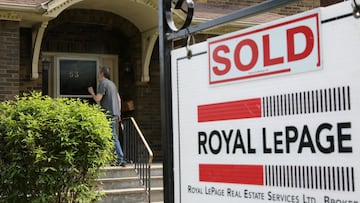Will US home prices drop in 2022 according to experts?
The red-hot housing prices are set to cool over the coming months. Some overpriced markets could even see a decline over the next couple years.

Looking at the red-hot housing market since the covid-19 pandemic upended just about everything, you may think that the US is in the grips of another housing bubble. Although the market has become “unhinged from fundamentals” the situation is much different than the last time.
Lockdowns and remote working led Americans to reconsider where they live which has driven a flurry of housing purchases. However, all those buyers found themselves chasing after a crimped supply on the market, partly a hangover from the Great Recession. Because of that, and along with disruptions from the covid-19 pandemic, prices have been climbing.
Also see:
Red-hot housing market predicted to cool
Prices for homes have skyrocketed since the onset of the pandemic, data have them up anywhere between 32 percent and 39 percent higher. The current median sale price of houses sold in the US in the first quarter of 2022 was $428,700 according to the St Louis Federal Reserve. Most economists though agree that the pace of rising prices can’t continue and will at worst level off or rise more slowly.
A recent Fitch Ratings analysis lowered the agency’s prediction for new and existing home sales from at best rising slightly to now experiencing perhaps a mid-single-digit decline in 2022. The high-teens growth during 2021 will drop to around 10 percent increase in prices this year and slowing down further in 2023.
Rapidly rising mortgage rates, which have well-surpassed the predicted three percent at the end of 2021 for this year, is currently above five percent, which will likely weaken housing activity over the intermediate term due to diminished affordability. Around 80 percent of the typical homes listed have seen the cost of financing increase by 50 percent compared to a year ago from a combination of the all-time high listing prices and higher interest rates according to Realtor.com data.
Housing activity will likely weaken over the intermediate term as rapidly rising mortgage rates further erode affordability. Stagflation would pose additional risk. Read more: https://t.co/SthylrvvMF#Housingmarket #USmortgage #stagflation pic.twitter.com/jnnxmbtC3e
— Fitch Ratings (@FitchRatings) May 11, 2022
Some cities could see a drop in housing prices of up to 15 percent
Mark Zandi, the chief economist at Moody’s Analytics, told NPR that he expects prices to come down in some of the “most juiced-up markets.” And, if “prices are 5, 10, 15% below where they are today where they’re peaking,” in two years’ time “I’d say that sounds about right to me,” he said. However, he doesn’t see a housing collapse because home prices will be bolstered by a couple fundamentals, supply and improved lending practices.
According to Freddie Mac, the government-sponsored agency charged with keeping mortgage markets liquid, the US market lacks around 4 million homes to meet the country’s needs. The shortage is a result of a decade of insufficient homebuilders available for new home construction, many of whom went under during the collapse of the housing bubble. With the level of demand not expected to wane drastically the limited supply will keep prices fairly high.
A housing inventory crunch is making life impossible for home buyers. Our interactive map can help you track the availability of houses for sale near you.https://t.co/RVfYolemYF pic.twitter.com/RhqsTFB0uG
— MarketWatch (@MarketWatch) May 13, 2022
Lenders and borrowers in a better position
The housing bust in 2007 brought about new federal rules that put an end to exotic mortgages that had adjustable loan rates that could spike which caught many borrowers off guard 15 years ago. As well, in addition to requirements for borrowers to document that they can afford the home that they are buying, “lenders have been very cautious,” according to Zandi.
Related stories
That doesn’t mean that there isn’t exuberance in the US housing market. The Dallas Federal Reserve warned that there have been signs for more than five consecutive quarters through third quarter 2021 of “heighten expectations of strong house-price gains.” This has raised concerns that house prices are “becoming unhinged from fundamentals” once again.
Where might house prices decline in the future?
Comparing expected prices based on historical trends to today’s actual prices Zandi has estimated just how much homes are overvalued in more than 400 cities and towns across the US. Just because prices in some markets are well-above where he would have expected, that doesn’t mean necessarily mean though that he thinks there will be a dramatic decrease in prices. Here’s a look at the ten at the top of the list.
| Boise, ID | 73% |
| Sherman-Denizon, TX | 60% |
| Muskegon, MI | 59% |
| Morristown, TN | 57% |
| Homosassa Springs, FL | 57% |
| Lake Havasu City-Kingman, AZ | 56% |
| Kahului-Wailuku-Lahaina, HI | 55% |
| Dalton, GA | 55% |
| Flagstaff, AZ | 51% |
| Pocatello, ID | 49% |


